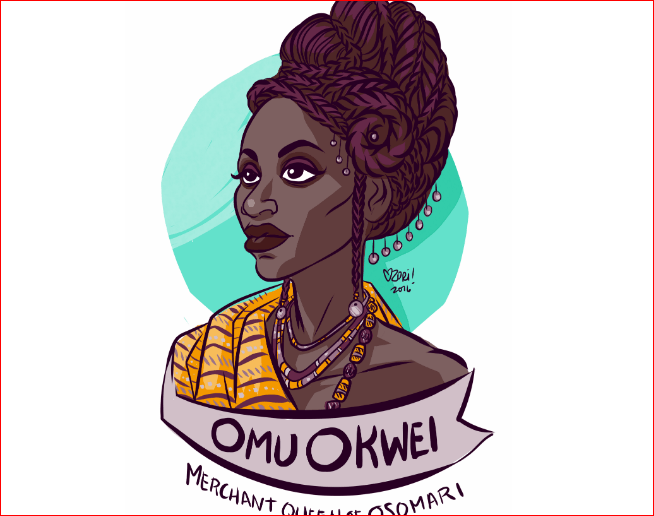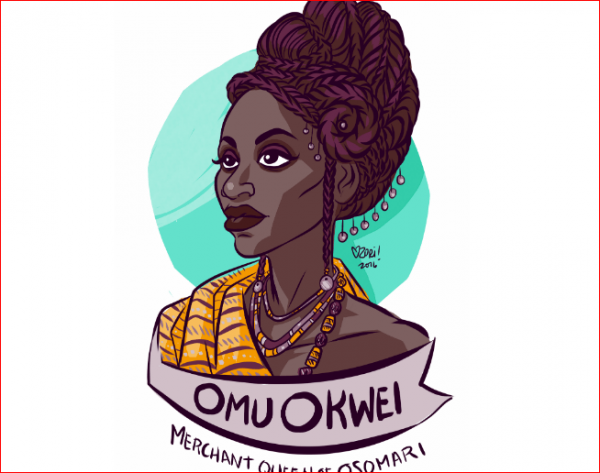With name variations such as Omu Okwei, queen of Osomari; Felicia Ifeoma Ekejiuba. Okwei (Pronunciation: Oak-way) was born Felicia Ifeoma Ekejiuba in 1872 as the daughter of Prince Osuna Afubeho, of the Igbo tribe, and one of his several wives. She was a granddaughter of Abo king Obi Ossai.
Read more about Nigerians In History
Her father was a celebrated warrior and a wealthy man, the owner of many trading and war canoes as well as several hundred slaves who fought and traded for him throughout Nigeria. Her grandfather was King (Atamanya) Nzedegwu of Osomari, who had reigned in the mid-19th century, establishing trading relations with the British and also inviting Roman Catholic missionaries into his kingdom.
Okwei’s mother, one of the prince’s several wives, was from a family of equal prominence; her father Obi Aje was the son of Obi Ossai, an important king of Abo who had signed agreements with British traders in 1830. At the age of nine, her mother sent her to live among the Igala with one of her aunts. She learned basic business practices and traded fruits, yams and poultry. When she was 15, following the death of her father, she lived with her mother at Atani, a city on the Niger River.
In 1889, she married Joseph Allagoa, a trader from Brass. Her family disapproved of her choice and did not give her a dowry. The couple had a child, Joseph, and divorced the following year. She traversed the Niger River, selling clothing, pots, and lamps. She exchanged the merchandise for food which she then sold to Europeans. In 1895 she married Opene of Abo, whose mother was Okwenu Ezewene (1896–1904), another wealthy woman trader. Okwei had a second son, Peter.
Okwei of Osomari the Merchant Queen
Okwei is regarded as the Nigerian trader who created an extensive business network throughout Nigeria and was crowned omu or queen of Osomari in 1935, a tribute to her leadership and success. By age 15, began building a trading network; went into partnership with her mother-in-law, Okwenu Ezewene (1896–1904); became an agent of the Royal Niger Company (1904); was one of Nigeria’s wealthiest women (1920s); crowned Omu (Queen) Okwei of Osomari (1935), a title bestowed on no one else after her death.
Sign up to the Connect Nigeria daily newsletter
Okwei’s mother had no male child who survived to adulthood, which limited her claims to her husband’s property. It was in the Nigerian tradition for women to support themselves, however, usually through farming and trading, and Okwei’s mother was an astute and successful trader, selling vegetables, palm oil, cloth, and a wide variety of goods throughout the country.
Recognizing that her daughter’s future prosperity might well depend on her ability to trade, Okwei’s mother sent her, at age nine, to live with one of her aunts among the Igala. Nigeria was a country of many tribes and languages, and success in trade depended on mastering the system of extensive trade networks and the languages are spoken in trade, one of which was Igala. While living with her aunt, Okwei learned Igala and basic business practices. She traded first in fruits and vegetables, then moved into yams and poultry.
Okwei rejoined her mother when she was 15 after her father had died, and they lived at Atani, a port on the River Niger. In 1889, when she was 17, she chose to marry a trader named Joseph Allagoa, whose family’s importance was not equal to hers. Upon marriage, a daughter traditionally received a dowry from her family which she would use as capital in her trading ventures, but Okwei’s family, disapproving of Allagoa, refused to provide her with one.
Headstrong and independent, Okwei nonetheless married the man of her choice. Through him and his friends she met and cultivated many important traders and agents. True to her family’s expectations, her husband left her the following year, shortly after the birth of her son Joseph, but the valuable business relationships she had forged survived the breakup.
With her line of merchandise expanded to include pots, pans, lamps, and clothes, she travelled along the River Niger, exchanging the manufactured goods for foodstuffs from Nigerians which she then sold to the Europeans at a profit. Friendly, hardworking, and honest, Okwei was popular with Africans and Europeans alike.
Omu Of The Osomari
The British colonial government formalized male institutions while undermining those of the women. Officials issued warrants to men that gave them the authority to sit in Native courts. Okwei was one of few women who were offered a warrant and served in the Onitsha Native Court from 1912 until the 1930s.
She was given the title of omu of the Osomari in August 1935. In the traditional dual-sex government, the omu was the apex leader of the congress of women leaders, overseeing women’s affairs and settling disputes.
She was elected Market Queen, Chairwoman of the Council of Mothers after amassing a fortune. She was the last merchant queen before the British replaced the Council of Mothers’ traditional role supervising retailing. She is the great-great-grandmother of Nigerian-British singer Ikstarr. Okwei died in 1943 in Onitsha, Nigeria.
Sources:
Commire, Anne, ed. (1999). “Okwei of Osomari (1872–1943)”. Women in World History: A Biographical Encyclopedia. Waterford, Connecticut: Yorkin Publications.
Aka, Jubril Olabode (2012). “Madam Omu Okwei”. Nigerian Women of Distinction, Honour and Exemplary Presidential Qualities. Trafford Publishing. p. 176.
Chuku, Gloria (2013). The Igbo Intellectual Tradition: Creative Conflict in African and African Diasporic Thought. New York: Palgrave Macmillan.
Encyclopedia
Got a suggestion? Contact us: [email protected]


